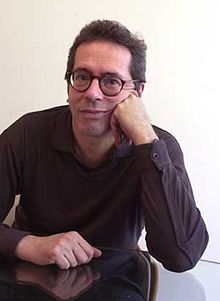César Aira
| César Aira | |
|---|---|
 |
|
| Born |
23 February 1949 Coronel Pringles, Buenos Aires Province, Argentina |
| Occupation | Novelist, Short Story Writer, Essayist |
César Aira (Argentine Spanish: [ˈse.saɾ ˈai.ɾa]; born 23 February 1949 in Coronel Pringles, Buenos Aires Province) is an Argentine writer and translator, and an exponent of Argentine contemporary literature. Aira has published over eighty short books of stories, novels and essays. In fact, at least since 1993 a hallmark of his work is an almost frenetic level of writing and publication—two to four novella-length books each year. He has lectured at the University of Buenos Aires, on Copi and Arthur Rimbaud, and at the University of Rosario on Constructivism and Stéphane Mallarmé, and has translated and edited books from France, England, Italy, Brazil, Spain, Mexico, and Venezuela.
Besides his fiction, and the translation work he does for a living, Aira also writes literary criticism, including monographic studies of Copi, the poet Alejandra Pizarnik, and the nineteenth-century British limerick and nonsense writer Edward Lear. He wrote a short book, Las tres fechas (The Three Dates), arguing for the central importance, when approaching some minor eccentric writers, of examining the moment of their lives about which they are writing, the date of completion of the work, and the date of publication of the work. Aira also was the literary executor of the complete works of his friend the poet and novelist Osvaldo Lamborghini (1940–1985).
Aira has often spoken in interviews of elaborating an avant-garde aesthetic in which, rather than editing what he has written, he engages in a "flight forward" (fuga hacia adelante) to improvise a way out of the corners he writes himself into. Aira also seeks in his own work, and praises in the work of others (such as the Argentine-Parisian cartoonist and comic novelist Copi), the "continuum" (el continuo) of a constant momentum in the fictional narrative. As a result, his fictions can jump radically from one genre to another, and often deploy narrative strategies from popular culture and "subliterary" genres like pulp science fiction and television soap operas. He frequently refuses to conform to generic expectations for how a novel ought to end, leaving many of his fictions quite open-ended.
...
Wikipedia
